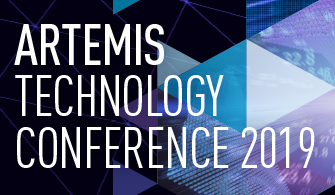- Published on 04 Mar 2019
- Events
Upcoming ARTEMIS Technology Conference 2019
The world is facing challenges that need deep technological solutions. On 16 - 17 April 2019, the ARTEMIS Technology Conference will look into these challenges at the Steigenberger Airport Hotel in Amsterdam.
The digital transformation to Industry 4.0 brings with it both new opportunities and challenges. Production equipment itself will become intelligent, so what innovation in embedded intelligent systems help us to enable collaborative automation in the future? And what about the increase of the ageing population? We know that for older people, losing their ability to drive can be a huge psychological blow, but the development of smart cars can help them to stay mobile and lead more active lives. This is just a grasp of the challenges Europe’s society will face.
Prof. Martin Törngren, KTH Royal Institute of Technology (Stockholm, Sweden)
One of the many speakers is Martin Törngren. He has strong expertise in embedded and distributed control systems, safety, and systems architecting. Multidisciplinary research has been characteristic throughout his career. He has been a pioneer in bridging the gaps between automatic control and real-time distributed systems, worked closely with industry, created one company and one startup. In recent years he has devoted research to architectures and design methodologies to deal with complex automated cyber-physical systems.,
Inspired by a recent modular four month sabbatical in the US, multiple exchanges with Silicon valley, and an in-depth analysis of the characteristics of Cyber-Physical Systems (CPS), Törngren, will talk about his assessment of the current state of affairs, what the implied opportunities and challenges are, and discuss what might make sensible directions forward for Europe.
By way of introduction he will reflect on the ongoing technological shift, manifested by advances in information technology, integrated CPS and bio-technology, and the simultaneous climate warming that may result in an ecological collapse. These challenges and corresponding opportunities, raise a number of key questions. How should the current situation be understood, what are the key implications and what would be appropriate responses by Europe?
Related to the technological shift, market forces - dominated by Chinese and US investments, are plunging billions of billions of dollars into new technologies and systems in areas such as automated driving, artificial intelligence and the Internet of things. These investments are pushing and driving technology developments at an increasing speed, imposing new risks with respect to safety that is likely not to have the highest priority, and posing challenges for technological leadership.
While promoting new technology with unprecedented capabilities and innovation potential, these developments are moreover taking us into new unregulated territories without existing socio-technical frameworks nor engineering methodologies, posing further challenges for policy making, competence provisioning, understanding of emerging societal effects, and public awareness (primarily of risks). A summary of an analysis of the facets of complexity of forthcoming CPS and limitations of existing engineering methodologies will be presented, and ways forward to deal with the unprecedented complexity will be proposed.
What role should Europe take, and where should Europe invest as this new era is shaping? This question will be treated by considering the mentioned global challenges and through a SWOT analysis, discussing strategies forward that exploit European strengths and opportunities, in areas such as circular economy, dependability, life-long learning, and private-public collaborative initiatives.
ATC 2019 is your 1,5 day event to participate in technological presentations on Digital industry, focusing on the technological challenges that need to be solved in the coming years.
Go to https://artemis-ia.eu/technology-conference-2019.html to register for the event.


